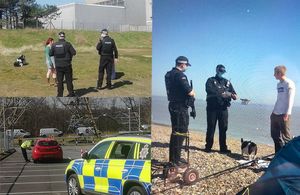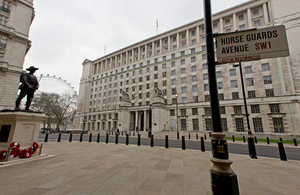Good afternoon.
Our transition to a green, sustainable future is happening.
Propelled by governments, business, investors, and civil society.
The price of renewables is tumbling.
Business leaders like Mukesh Ambani, and Bill Gates, tell me that they see huge business opportunities in the global move to clean growth.
And preeminent financial publications, such as the Financial Times, are holding climate capital summits attended by leading global firms.
When I first started work in finance in the 1990s such events, if they had happened at all, would have been niche affairs, made up of a limited number of enthusiasts, even evangelists.
Well, the good news is that there are a lot more enthusiasts today. And indeed a lot more evangelists.
The more sobering news however is that, despite progress, we are not moving fast enough.
As things stand, the world is far from meeting the goals of the Paris Agreement.
That goal to limit global temperature rises to well below two degrees, preferably to 1.5 degrees.
Already, temperatures have risen over one degree since the Industrial Revolution.
And the effects of the climate crisis are being felt all around the world.
The previous decade was the hottest on record.
And through my work on COP26, I have witnessed the devastating impacts of climate change:
Melting glaciers, sea level rises, crop degradation, deforestation.
And pollution choking some of the world’s great cities.
I have spoken to communities on the frontline of the fight against climate change.
About how their lives have been disrupted.
How their livelihoods are threatened.
And how their homes are at risk.
We cannot go on as we are.
If we do not change course, things will deteriorate rapidly.
Unleashing a level of human, economic, and environmental catastrophe the likes of which the world has not seen before.
So, we have got to act now, to speed up the transition, and keep the goals of the Paris Agreement within reach.
Those goals depend on our reaching net zero emissions by the middle of the century at the latest:
So, a core ambition for the UK’s COP26 Presidency is to put the world on a path to net zero.
To achieve that, we are pushing for action from across society.
From business, to investors, civil society and governments. And we’re pushing around three key aims: ambition, finance and collaboration.
We are also working to protect people and nature, helping them to adapt to the effects of our changing climate.
However, today, I want to focus on these first three aims.
So, firstly, ambition.
We need a clear desire, particularly from countries and companies, to get the global economy on a path to net zero.
Now, there is real progress here.
When the UK took on the COP26 presidency, less than 30 percent of global GDP was covered by net zero commitments.
That figure stands at around 70 percent today, and it includes Japan, South Korea, the USA and China.
1700 companies from around the world have now joined the Race to Zero campaign, which commits them to reach net zero by 2050 at the latest, on science-based targets.
And this includes corporate giants like Facebook, like Hitachi and EY.
I am urging all companies to join them.
Doing so is not only good for the planet, it benefits the bottom line, and ultimately drives shareholder value.
As Anand Mahindra said at Davos three years ago, and I quote:
“Everything that our group of companies has done to try to improve energy to reduce greenhouse gas emissions has given us a return.”
I am also urging all countries that have not already done so, to make net zero commitments.
And to set out those short term targets, their 2030 Nationally Determined Contributions, that put them on a path to get there.
The latter is vital, to ensure that net zero is not a vague aspiration but an achievable aim.
But it is, where unfortunately, where we are falling short.
Despite brilliant ambition from some countries, the world’s collective 2030 emissions reductions are nowhere near enough to meet the goals of the Paris Agreement.
Changing this is a clear focus for UK diplomacy.
As the Prime Minister said recently in the UK’s Integrated Review, tackling climate change and biodiversity loss are now the UK’s top international priority.
So, we want short-term targets from all countries, particularly the G20, that put them on a path to net zero.
And policies that make them a reality.
So, as the world repairs the economic damage inflicted by Covid-19, we are urging governments to plan for green recoveries.
And we are calling on them to commit to stopping the sale of new petrol and diesel vehicles.
To ending new coal power. And to phasing out existing plants.
Policies that we know can help to simulate investment, by providing business and investors with clarity and confidence.
Secondly, to reach global net zero, we need finance.
It is the vital ingredient that turns ambition into action.
And that’s why it is a key priority of the UK’s COP Presidency.
We want to get finance flowing to climate action, particularly in developing countries.
So, we are working with donor countries and multilateral development banks on public finance, including to increase the actual sums that are available.
And to get more money to helping countries to adapt to the impacts of an already changing climate.
Public finance is, of course, absolutely vital.
But it is private finance that will get us to the trillions required for global net zero.
So, we are also working to unleash private investment. And ensuring every financial decision takes climate into account.
I am calling on all financial institutions to join the Race to Zero.
By signing up to campaigns such as the Net Zero Asset Managers Initiative, Net Zero Asset Owners Alliance, and Business Ambition for 1.5 degrees.
And I am urging them to disclose in line with the Task Force on Climate-related Disclosures recommendations.
To increase finance in emerging markets and developing countries.
And to commit to the finance principles of the Powering Past Coal Alliance – which aims to speed up the move from coal to clean energy.
There is real momentum building up across financial sectors.
The Net Zero Asset Managers Initiative was launched in December last year.
And as of mid-March, asset managers representing over $9 trillion of assets under management have joined.
That’s around 10 percent of global assets under management.
And the numbers are growing rapidly, with new signatories announced yesterday.
Earlier this month, Aviva set a 2040 net zero target.
And, as a major fund manager, it wrote to the biggest emitters in its portfolio, to say it will divest if it does not see serious engagement on emissions reductions.
My challenge to other fund managers is: will you do the same?
Many corporates have understood that climate risk is financial risk.
And the move to net zero presents enormous opportunities for financial institutions.
According to the charity CDP, 215 of the biggest global companies report almost $1 trillion at risk from climate impacts.
And yet, together, their potential gains from the move to a clean economy stand at over $2trillion.
Finally, to reach global net zero, we must work together.
That is why enhancing international collaboration is another of the key priorities of the UK’s COP26 Presidency.
And we are working to build consensus among governments, ahead of COP26 so that the negotiations in Glasgow are a success.
Including, on issues like Article 6 of the Paris Agreement, which relates to carbon markets.
And we are building-up collaboration among policy-makers, investors, business and civil society, around critical sectors like clean energy and clean transport.
Because with well-targeted collaboration in each sector, we can create economies of scale, we can spur innovation, and increase incentives for investment.
And thereby creating a means to deliver emissions reductions at the scale and pace required to meet global net zero.
Our COP26 Climate Champion, Nigel Topping, who you have heard from today, together with the COP25 Climate Champion, Gonzalo Muñoz, is also doing brilliant work here.
Corralling business and other non-state actors to sign-up to achieving net zero emissions.
And I am fully behind them.
Because with action from business and investors, from governments and civil society, we can up our ambition, get finance flowing, and collaborate successfully.
Growing our economies.
Creating jobs and prosperity.
Whilst reaching global net zero, together.
Thank you.

